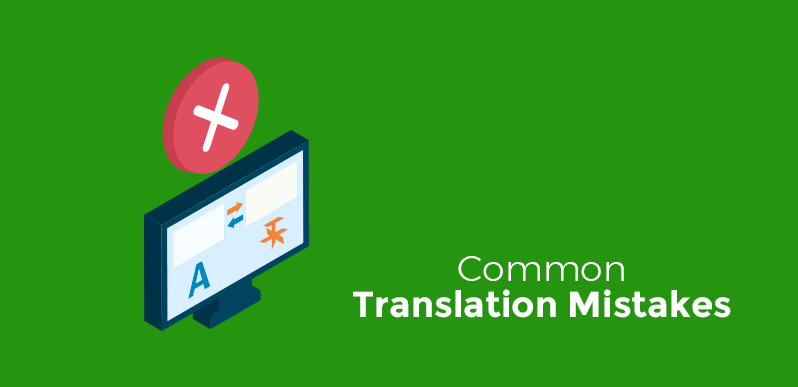Estimated reading time: 6 minutes
Even the most experienced translators incur in translation mistakes. Translation of any kind of document is a complex, technical job that demands skill, precision and of course, excellent command of written language in at least 2 languages.
This includes a good understanding of the syntax, terminology, idioms, and even the culture of the region where the specific language is used, and this stands true regardless of whether it is a transcripts translation, or any other.
Often however, translators find it tough to do a good job of translation – either because they are still new, or because they are not fully aware of the requirements of the job.
These are the main translation problems and their solutions, but in this article let’s look at the 9 most common translation mistakes made by translators:

1. Ineffective Communication
If you communicate poorly with the client, there could be misunderstandings on both sides; you may not understand their requirements, and they may not realize your constraints.
Therefore it is crucial that you maintain a clear channel of communication, and to not hesitate to get all your queries cleared. This will help you do a better job of translating.
2. Translating Word for Word
The job requires that you translate the source document into the target document without changing the meaning of the text, not to do a literal translation. When you translate word for word, the resulting text may not make much sense.
Each language has its own style of sentence construction or syntax; in some languages, the placement of the adjective may be different; the subject verb agreement rules may differ; in other ones, inanimate objects are also assigned gender which is not done in English; it’s also possible that the gender assigned in the two languages differs.
For example, in German, it’s the fatherland, and not motherland – and so on. Idiomatic expressions also need to be dealt with carefully – if translated verbatim, it may not mean anything close to the original.
To expand on the topic read: Translation Quality Assessment : Things You Need To Know.

3. Using Incorrect Words
This can happen often with inexperienced translators; they may use words in the incorrect context. There are certain words, phrases and jargon that simply have no equivalent in the target language; in such cases, it’s better to leave the original term as it is rather than concoct something because you feel every single word must be translated!
This holds especially true for a legal documents translation as there are several Latin or French phrases that are use even in English documents, or in courts where English is the only language used. For example: voire dire, ab inito, de facto, habeas corpus, and so on.
If you are interested on this topic check the Tips for translating legal documents.
Bank Statement Translation Service
Still confused with Bank Statement Translation? Get the expert results from TranslateDay as we help you translate bank statements, both notarized and certified at affordable cost. You will have your certified bank statement translation in 24 hours.
Translate Now4. Exaggeration of Word Meanings
Sometimes translators are tempted to go over the top in an attempt to appear diligent. However it is not required, and certainly not appreciated, when the translated document is peppered with complicated and technical terms. It is important to understand what the client needs, and to proceed accordingly.
Keep the language simple if it’s for personal use or it’s a guide or manual. If it’s more of a literary work and is to be published, ask for guidelines as to the publishing standard required.
Something you might be interested in: Most Beautiful Untranslatable Words In World.
5. Using Incorrect Tone and Style
Each type of document has a certain style of scripting, and it’s important to know that. If you are unfamiliar with the appropriate style, the translated document could be disastrous. For example, you can’t translate legal documents and a medical transcript or a movie script the same way. Each of these has their own distinct style. If you don’t use the appropriate style, the translated document will seem soulless.
The right tone is very important. Even the punctuations can differ from language to language. A comma used in English may be unnecessary in say Spanish. It’s very important to know the nuances of each language to do justice to the work.
Another thing you need to remember is date and time formats; do you need to use the 24 hour format, or am/pm? Do you need to write the date as DD/MM/YYYY or MM/DD/YYYY, or is there another format altogether used in the target language? How is the currency to be expressed? These may seem like small things but they can make a huge difference.
Resume Translation Service
Are you planning to work abroad? Then you definitely need a professional Curriculum Vitae Translation. We provide you with Professional Resume Translations in less than 24 hours. Trust us to translate your resume and you will not regret it.
Translate Now6. Working in a Language you’re not proficient In
You need to be truly proficient in the language you’re translating from and translating to, to be able to do justice to the translation work. If you accept work to translate to or from a language you know well but are not really proficient in, you’re quite likely to make translation mistakes, and this could affect your reputation and future opportunities.
7. Accepting More Work than you Can Handle
Most professional translators on an average can handle about 2000 words per day; of course this number could vary based on the time needed for research. There is no point in accepting too much work and then not being able to deliver as promised.
It’s always to under promise and over deliver rather than vice versa. Apart from the work suffering, your health will also suffer; you will be fatigued and may even get stressed. This can lead to irreparable translation mistakes.
Check our FAQ if you want to know more about a real case scenario: Translateday FAQ.
8. Accepting Documents Not In Your Area of Specialization
This is very important; just as an eye specialist who will not accept patients with say heart problems, as a translator, you should only accept work that is under the topics you’re very familiar with. Experience leads to expertise and will let you do stellar work in the topics you’ve specialized in.
Some may specialize in translating literary works, others in legal documents, perhaps in technical documents, some in film scripts, and others in medical transcripts. So you need language plus subject specialization, and only accept work where you have expertise in both.
Each niche has its own style and tone as we mentioned earlier, and even specific jargon which can be pretty difficult if you’re not familiar with the subject.
Birth Certificate
Translation Service
A certified birth certificate translation is a legal document that is required for various legal processes like USCIS immigration requirement. Trust us to translate your birth certificate and you will get your birth certificate translation notarized and certified.
Translate Now9. Not Keeping Yourself Up To Date
Just like technology that evolves all the time, language is also evolving; new words, terms and idioms or catchphrases keep making their appearance. It is important to stay abreast of these developments, so that you can use them in your work. Continuous learning is important for translators, so that you’re not caught off-guard when you see an unfamiliar word.
Knowing the pitfalls help you avoid them. Keep in mind where you can go wrong, and make sure you don’t commit these translation mistakes.
TranslateDay provides Certified Translation Services for all kinds documents. It has been able build an untarnishable trust with their prompt and accurate interpretation. It has become a fast rising player in the translation industry. Transalate Day employes the most experienced translators to bring clients a thorough translation with a touch of expertise.




